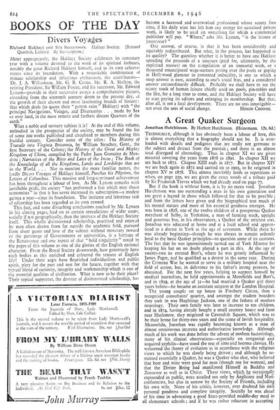BOOKS OF THE DAY
Divers Voyages
MOST appropriately, the Hakluyt Society celebrates its centenary year with a volume devoted to the work of its spiritual forbears, notably the great Richard Hakluyt himself, and to its own achieve- ments since its foundation. With a remarkable combination minute scholarship and infectious enthusiasm, the contributors— Dr. J. A. Williamson, Mr. G. R. Crone, Mr. R. A. Skelton, the retiring President, Sir William Foster, and his successor, Mr. Edward Lynam—provide in their successive essays a comprehensive picture, extending from the sixteenth century down to the present day, of the growth of their chosen and most fascinating branch of history: that which deals (to quote their "patron saint" Hakluyt) with "the principal Navigations, Voiages, and Discoveries . . made by Sea or over land, in the most remote and farthest distant Quarters of the .earth."
. What a noble and savoury subject it is! At the end of this volume, embodied in the prospectus of the society, may be found the list of some 2oo works published and circulated to members during this fruitful century. Consider some of the titles: The History of .Travaile into Virginia Britannia, by William Stcachey, Gent., the first Secretary of the Colony; the History of the Great and Mighty Kingdom of China, compiled by the Padre Juan Gonzalez de Men- doza; Narratives of the Rites and Laws of the Incas ; The Book of the Knowledge of all the Kingdoms, Lands and Lordships that are in the World. . . . Not to mention the more familiar names, the lordly Divers Voyages of Hakluyt himself, Purchas his Pilgrims, the Letters of Columbus. This massive and long-continued achievement has been throughout a labour of love. As Mr. Lynam remarks with justifiable pride, the society "has performed a feat which may shock economists" in that it has never increased its subscription—a modest guinea a year—since its foundation. The intricate and laborious task of editorship has been regarded as its own reward. This fact, and some disturbing conclusions reached by Mr. Lynam in his closing pages, lead on to certain speculations of wider scope, socially if not geographically, than the interests of the Hakluyt Society itself. This wholly disinterested scholarship, practised and enjoyed by men often drawn from far outside the academic field, pursued from sheer gusto and love of the subject without monetary reward or the patronage of Governments or universities, is a heritage of the Renaissance and one aspect of that "bold singularity" noted in the pages of this volume as one of the glories of the English national character. From the Royal Society downwards, haw generously have such bodies as this enriched and coloured the texture of English life! Under their aegis have flourished individualism and public spirit, piety for the past and zest for the future, together with that typical blend of curiosity, integrity and workmanship which is one of the essential qualities of civilisation. What is now to be their place? Their typical supporter, the devotee of disinterested scholarship, has
become a harassed and overworked professional whose scanty free time, if his daily stint has left him any energy for sustained private work, is likely to be used on something for which a commercial publisher will pay. "Where," asks Mr. Lynam, "is the leisure of yesteryear? "
One answer, of course, is that it has been considerably and equitably redistributed. But what, in the process, has happened to its quality? The question whether it is better to have one Hakluyt spending the proceeds of a sinecure (paid for, ultimately, by the exploited masses) on the compilation of an immortal work, or thousand emancipated wage-earners poring over the pools or gaping at Hollywood glamour in contented imbecility, is one to which a snap answer is easy, according to one's social bias, and a considered answer extraordinarily difficult. Probably we shall have to see the scanty stock of human leisure chiefly used on pools, pin-tables and the like, for a long time to come, and the Hakluyt Society will have to start paying its editors and enlarging its membership. But that, after all, is not a fatal development. There are no seas innavigable-


































 Previous page
Previous page